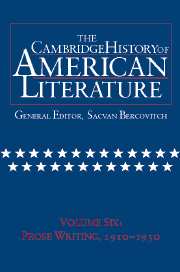Book contents
- Frontmatter
- Introduction
- A Cultural History of the Modern American Novel: Introduction
- 1 A Dream City, Lyric Years, and a Great War
- 1 The Novel as Ironic Reflection
- 2 Confidence and Uncertainty in The Portrait of A Lady
- 3 Lines of Expansion
- 4 Four Contemporaries and the Closing of the West
- 5 Chicago’s “Dream City”
- 6 Frederick Jackson Turner in The Dream City
- 7 Henry Adams’s Education and The Grammar of Progress
- 8 Jack London’s Career and Popular Discourse
- 9 Innocence and Revolt in the “Lyric Years”: 1900–1916
- 10 The Armory show of 1913 and the Decline of Innocence
- 11 The Play of Hope and Despair
- 12 The Great War and The Fate of Writing
- 2 Fiction in a Tme of Plenty
- 3 The Fate of Writing During the Great Depression
- Fictions of the Harlem Renaissance
- Ethnic Modernism
- Chronology
- Bibliography
- Index
12 - The Great War and The Fate of Writing
from 1 - A Dream City, Lyric Years, and a Great War
Published online by Cambridge University Press: 28 March 2008
- Frontmatter
- Introduction
- A Cultural History of the Modern American Novel: Introduction
- 1 A Dream City, Lyric Years, and a Great War
- 1 The Novel as Ironic Reflection
- 2 Confidence and Uncertainty in The Portrait of A Lady
- 3 Lines of Expansion
- 4 Four Contemporaries and the Closing of the West
- 5 Chicago’s “Dream City”
- 6 Frederick Jackson Turner in The Dream City
- 7 Henry Adams’s Education and The Grammar of Progress
- 8 Jack London’s Career and Popular Discourse
- 9 Innocence and Revolt in the “Lyric Years”: 1900–1916
- 10 The Armory show of 1913 and the Decline of Innocence
- 11 The Play of Hope and Despair
- 12 The Great War and The Fate of Writing
- 2 Fiction in a Tme of Plenty
- 3 The Fate of Writing During the Great Depression
- Fictions of the Harlem Renaissance
- Ethnic Modernism
- Chronology
- Bibliography
- Index
Summary
“It is the glory of the present age that in it one can be young,” Randolph Bourne wrote in 1913, four years before World War I engulfed the United States and five before he died at age thirty-two. Scarred and disfigured at birth by a botched delivery, then crippled by spinal tuberculosis that deformed his back and stunted his growth, Bourne learned early to think of himself as too “cruelly blasted” to live a full life. Yet he wrote – Youth and Life (1913) and Education and Living (1917) and a series of essays for New Republic, Masses, Seven Arts, and Dial – as a fully engaged critic about the major concerns of the Lyric Years: youth, rebellion, education, politics, literature, and the arts. When it happened that he did not survive his age (he died in December 1918 of influenza), his friends came to regard him as the writer who best embodied its lost hope. After his death, both James Oppenheim and Van Wyck Brooks edited collections of his essays – Untimely Papers (1919) and The History of a Literary Radical (1920) – in order to help establish him as its representative cultural critic.
Had Bourne written about himself, as several critics of his time did, such a development might seem less odd. In fact, however, though he took Walt Whitman as one of his prophets, Bourne avoided himself as subject. He focused instead on the aspirations and anxieties of his age, as though hoping vicariously to live them, and so made its yearnings his yearnings, its despair his despair.
- Type
- Chapter
- Information
- The Cambridge History of American Literature , pp. 89 - 101Publisher: Cambridge University PressPrint publication year: 2002

